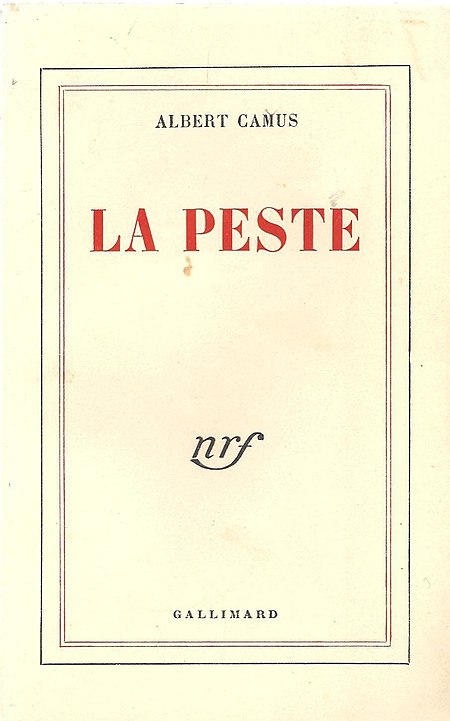Albert Camus, The Plague
reviewed by Nick Pipitone

The Plague Publisher: Gallimard Date: June 1947 Length: 336 pp. ISBN: 978-2-07-036042-0 |
I have a slight problem with book-buying binges. When I feel anxious, sometimes I buy a book. I’ve reined in this annoying habit recently to cut expenses. But when the pandemic hit in early March, I saw an essay about Albert Camus’ novel, The Plague, and I knew immediately I had to read it.
This was only the second work I’ve read by Camus. The Myth of Sisyphus is one of my favorite books, Camus’ treatise on his absurdist philosophy. I wasn’t disappointed by The Plague.
I loved The Plague because it detailed living through an infectious disease outbreak from an existentialist viewpoint. The characters display heroism, but some characters also show a stunning amount of cowardice. There’s no seeming rhyme or reason to the suffering wrought by the plague. Some characters I thought would survive and rise above simply died with a whimper.
The novel is set in the 1940s in the French Algerian town of Oran. Rats begin dying in droves, and the town is confused as to what’s happening. Soon it becomes clear the deaths are being caused by bubonic plague. Dr. Bernard Rieux, the main character, sees patients with symptoms of plague and urges the authorities to act. The authorities are slow to respond (sound familiar?), and the disease spreads like wildfire. The town then seals itself off, and people are unable to leave.
What’s great about the novel is it deals with the emotional and psychological toll the plague plays. Many people become restless, resort to merrymaking like there’s no tomorrow, or fall into deep depressions. The Plague deals with a disease outbreak isolated to one town, not a global pandemic. Camus includes a good bit of medical information about bubonic plague, but the book is more so about how the characters react under immense stress. The Plague shows we’re mostly powerless over the brute force of nature. Some characters talk of God and religion, but most try to summon their own resolve to deal with the disease’s terrors.
There’s a Jesuit priest in the novel — Father Paneloux — who gives stirring sermons during the outbreak. The priest seems to have a deep faith, but the plague presents a formidable challenge to his beliefs. As suffering mounts, the priest presents his case for Christianity, and the argument is torn apart by the bare-faced brutality of the disease. The priest says the plague has been sent by God because of the townspeople’s sins. When children die, he says it’s God’s will and must be accepted. Neither of these arguments hold much weight in the end, as the plague kills randomly, and the town loses interest in the Church.
Reviewers have said The Plague is a bleak book, and perhaps it is, but I felt it contained important truths. Mainly, that we’re all vulnerable to suffering and death, and we do our best to push it out of our consciousness. As our current pandemic continues, I’ve been thinking of that often. The public and government reaction have been chaotic (in America, at least), and maybe it’s because competing philosophies on death and dying are clashing against each other.
The characters in The Plague can’t do much to stop the suffering. The medical men try to mitigate the damage, men of God submit to the pain, and the everyday people do their best to retain hope. All of them can only wait out the disease until it passes, and life returns to normal. That’s the essential powerlessness the novel conveys. We’re in a similar situation with COVID-19. Science is helping us slow the spread and discover its causes — and a possible cure. But there’s only so much we can do with our human powers. The pandemic is a force of nature, and nature is a fickle mistress.
Copyright © 2020 by Nick Pipitone
Proceed to The Critics’ Corner...

